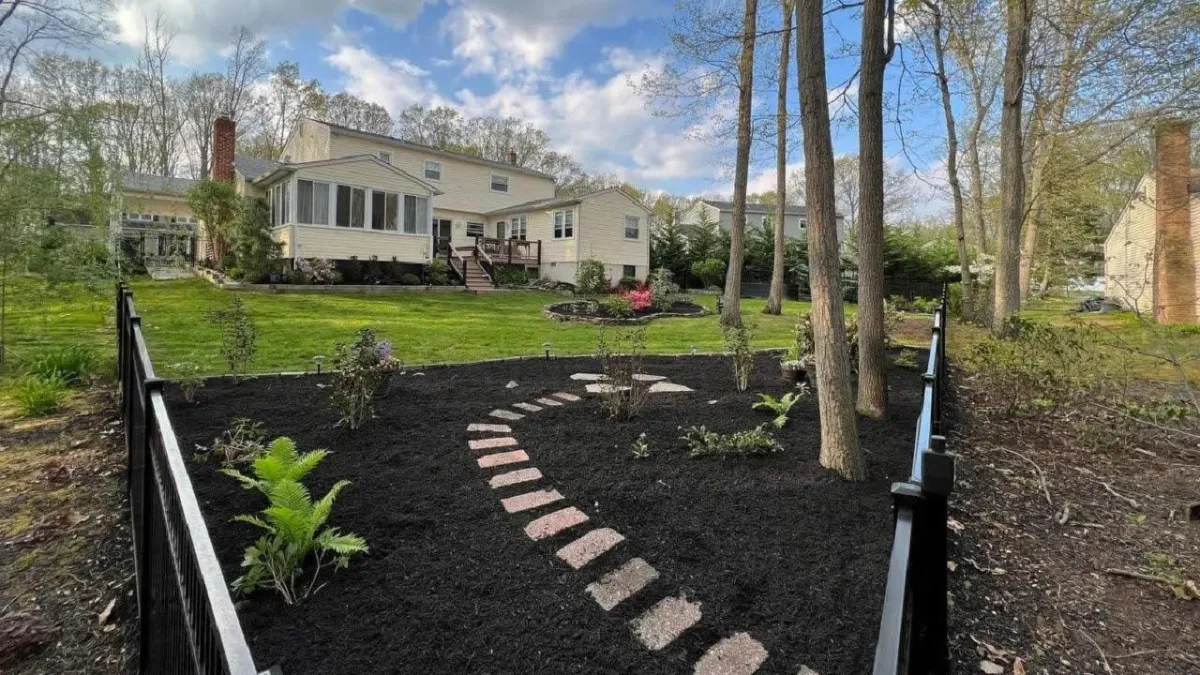BLOGS

Can Landscaping Play A Role In Conserving Water Resources?
Yes, landscaping can play a significant role in conserving water resources by using drought-tolerant plants, implementing efficient irrigation systems, and incorporating water-saving techniques such as mulching and soil amendments.
At Freedom Landscaping, we believe that in today's environmentally conscious world, the role of landscaping extends beyond aesthetic appeal to include sustainable practices that conserve natural resources. One such critical resource is water, and landscaping techniques can significantly contribute to its conservation efforts.
Key Takeaways
Landscaping plays a vital role in conserving water resources through strategic design and maintenance practices.
Choosing drought-resistant plants and optimizing irrigation systems are key strategies for reducing water consumption.
Sustainable landscaping not only benefits the environment but also enhances property value and community well-being.
Reducing Turfgrass for Water Conservation
Reducing turfgrass is an effective strategy for conserving water in residential landscapes. Traditionally, expansive lawns have been prized for their lush appearance, but they require significant amounts of water to maintain. As awareness of water conservation grows, homeowners are increasingly turning to alternatives that are less water-intensive.
Opting to reduce the expanse of turfgrass or replacing it with drought-resistant alternatives such as Zoysia or Bermuda grass can lead to substantial reductions in water consumption. These grass varieties have adapted to survive with less water, making them ideal choices for regions prone to drought or where water restrictions are in place. Not only do they require less irrigation, but they also retain their green color and texture throughout the year, providing an attractive landscape without the heavy water usage associated with traditional lawns.
Benefits of Reducing Turfgrass for Water Conservation:
Water Savings: Decreasing the area covered by turfgrass or choosing drought-resistant varieties significantly lowers water usage.
Cost-Effectiveness: Reduced water consumption translates into lower utility bills and less expenditure on lawn maintenance.
Environmental Impact: Less water usage contributes to conservation efforts and reduces the strain on local water resources. Additionally, it minimizes runoff, which helps prevent soil erosion and pollution of waterways.
Long-Term Sustainability: By promoting water-efficient landscaping practices, homeowners contribute to the overall sustainability of their communities and reduce their ecological footprint.
Enhanced Landscape Resilience: Drought-resistant grasses are more resilient to fluctuating weather conditions, ensuring a healthier and more sustainable landscape over time.
Implementing these strategies not only benefits homeowners directly but also supports broader environmental goals. By making informed choices about turfgrass and water use, homeowners can create attractive, sustainable landscapes that conserve resources and enhance property value.
Improving Soil Conditions
Improving soil conditions is crucial for optimizing water retention in landscaping. The quality of soil plays a pivotal role in its ability to absorb and hold water, directly influencing plant health and the overall sustainability of outdoor spaces. By incorporating organic materials like wood chips, peat moss, or compost into the soil, homeowners can enhance its water retention capacity and reduce runoff.
Organic materials act as natural amendments that improve soil structure and texture. Wood chips, for instance, not only help retain moisture but also decompose gradually, enriching the soil with nutrients essential for plant growth. Peat moss is known for its ability to absorb and retain water, creating a favorable environment for roots to access moisture. Compost, derived from decomposed organic matter, enhances soil fertility while improving its ability to retain water and nutrients.
Benefits of Improving Soil Conditions:
Increased Water Retention: Organic amendments improve the soil's capacity to hold water, reducing the frequency of irrigation needed for plants.
Reduced Runoff: Enhanced soil structure minimizes runoff, allowing water to penetrate deeper into the ground and replenish groundwater reserves.
Nutrient-Rich Soil: Organic materials enrich the soil with essential nutrients, promoting healthier plant growth and resilience against environmental stressors.
Improved Root Development: Optimal soil conditions support robust root systems, which are better equipped to access water and nutrients essential for plant health.
Sustainable Landscaping: By improving soil conditions, homeowners contribute to sustainable landscaping practices that conserve water and support ecosystem health.
By prioritizing soil health through the incorporation of organic materials, homeowners can create a more resilient and water-efficient landscape. These practices not only benefit plant life but also promote environmental stewardship by reducing water consumption and enhancing overall landscape sustainability.
The Role of Mulching in Water Retention
Mulching is a simple yet effective technique to conserve soil moisture. Materials like pine needles or shredded hardwood not only regulate soil temperature and inhibit weed growth but also minimize evaporation, keeping plants hydrated with less water.
Rain Gardens and Bioswales: Natural Water Management
Rain gardens and bioswales are designed landscape features that capture stormwater runoff, allowing it to slowly infiltrate the ground. By filtering pollutants and replenishing groundwater, these features not only improve water quality but also reduce strain on municipal drainage systems.
Water-Efficient Irrigation Systems
Modern irrigation systems incorporate advanced technologies that optimize water use based on plant needs and weather conditions. Techniques such as drip irrigation or smart controllers minimize water waste, making them both eco-friendly and cost-effective for homeowners.
Native Plants: Adaptable and Sustainable
Native plants are naturally suited to local climates and soil conditions, requiring minimal irrigation once established. By incorporating native species into landscaping designs, homeowners can create resilient ecosystems that thrive without excessive water input.
The Role of Regular Landscape Maintenance
Proper maintenance practices such as pruning, mulching, and timely watering schedules are crucial for preserving water efficiency in landscapes. Routine upkeep not only enhances the visual appeal but also ensures the long-term health of plants and soil.
Sustainable Landscaping: Practices, Native Plants, Irrigation Innovations, and Property Value Impact
Sustainable Landscaping Practices
In today's world, sustainability is not just a trend but a necessity. Sustainable landscaping practices integrate environmental stewardship with aesthetic appeal, offering homeowners ways to reduce their ecological footprint while enhancing their outdoor spaces.
Benefits of Native Plants in Landscaping
Native plants are the cornerstone of sustainable landscaping, offering numerous benefits beyond water conservation. From supporting local wildlife to requiring fewer pesticides, native species promote biodiversity and resilience in urban and suburban environments.
Innovative Irrigation Techniques
Advancements in irrigation technology have revolutionized water management in landscaping. From automated systems that adjust based on weather forecasts to precision watering through drip irrigation, these innovations help homeowners save water and money.
Impact of Landscaping on Property Value
Well-maintained landscapes not only beautify properties but also increase their market appeal and value. Investing in professional landscaping services can provide a significant return on investment by enhancing curb appeal and overall property aesthetics.
FAQs
What are the benefits of reducing turfgrass in landscaping?
Reducing turfgrass conserves water, lowers maintenance costs, and enhances drought resistance.
How do rain gardens and bioswales contribute to water conservation?
They capture stormwater, filter pollutants, and recharge groundwater naturally.
Why are native plants beneficial for water-efficient landscaping?
Native plants are adapted to local conditions, requiring less water and maintenance.
What are the advantages of mulching in landscaping?
Mulching retains soil moisture, regulates temperature, and suppresses weeds effectively.
How can homeowners improve irrigation efficiency in their landscapes?
By using smart irrigation systems and drought-resistant plant choices to minimize water usage.
Embracing Sustainable Landscaping Practices for Water Conservation
As we navigate the challenges of environmental sustainability, landscaping emerges as a powerful tool for conserving water resources. By adopting practices like reducing turfgrass, optimizing soil health, and embracing native plants, homeowners can contribute to water conservation efforts while enjoying beautiful and resilient landscapes.
Enhance your outdoor living space with Freedom Landscaping, New Jersey's premier landscape construction company. Contact us now to schedule a consultation and discover how sustainable landscaping practices can benefit your home and the environment.
Ready To Give Your Property The Love It Deserves?
Whether it is keeping your lawn professionally maintained or completely re-vamping the look of your landscape, let our team of professional landscapers at Freedom Landscaping take your property to a whole new level!
Contact Us
Mon - Sat: 7:00 am - 6:00 pm
Sunday: Closed
© 2025 Freedom Landscaping LLC. All Rights Reserved. Privacy Policy. Terms & Conditions. Web Design By Fused Media.


